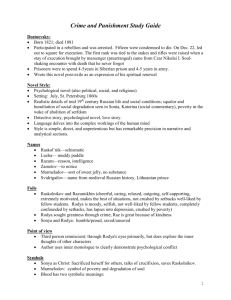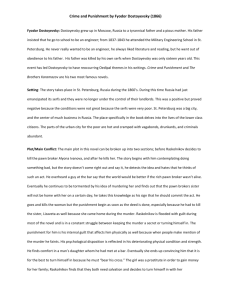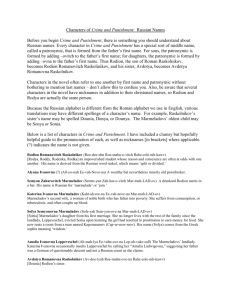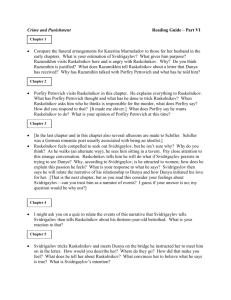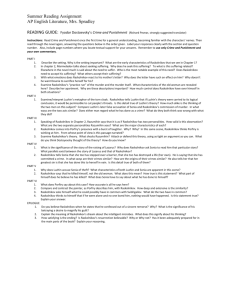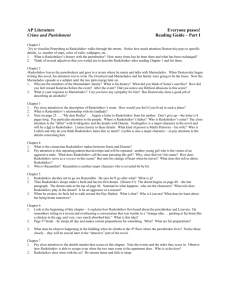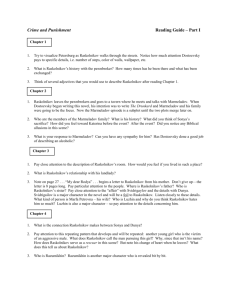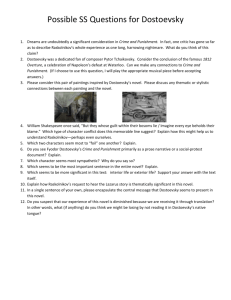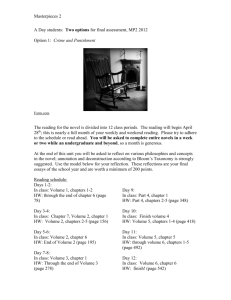10256,"extraordinary man",4,3,"2000-11-19 00:00:00",50,http://www.123helpme.com/view.asp?id=5258,4.3,31800000,"2015-12-24 12:44:19"
advertisement
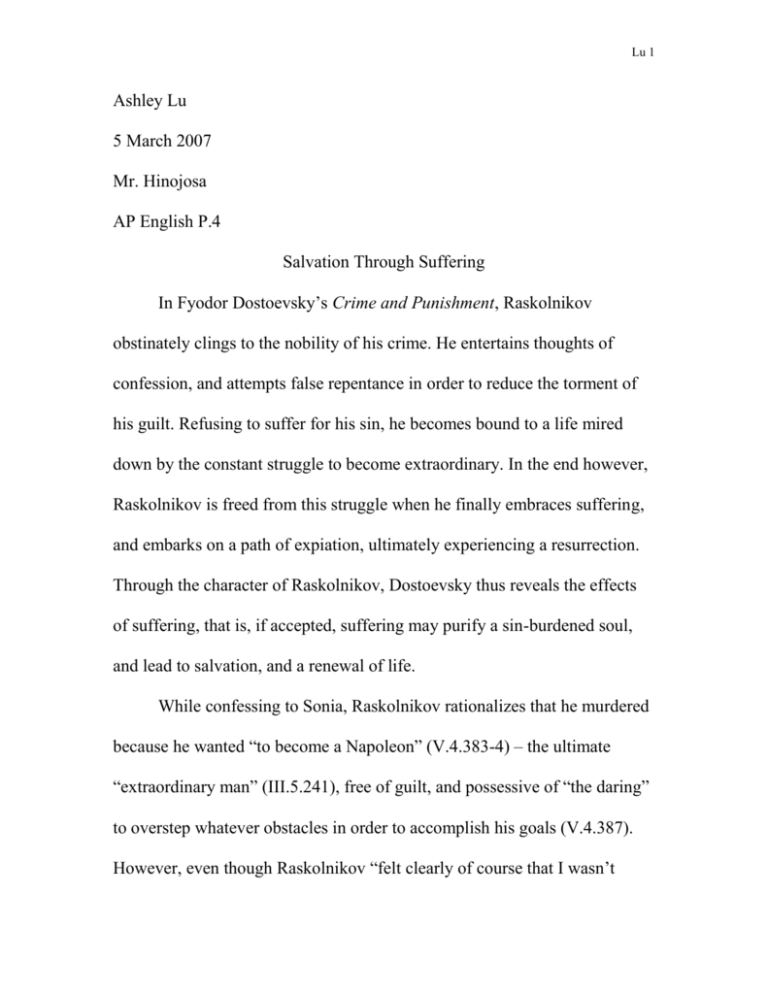
Lu 1 Ashley Lu 5 March 2007 Mr. Hinojosa AP English P.4 Salvation Through Suffering In Fyodor Dostoevsky’s Crime and Punishment, Raskolnikov obstinately clings to the nobility of his crime. He entertains thoughts of confession, and attempts false repentance in order to reduce the torment of his guilt. Refusing to suffer for his sin, he becomes bound to a life mired down by the constant struggle to become extraordinary. In the end however, Raskolnikov is freed from this struggle when he finally embraces suffering, and embarks on a path of expiation, ultimately experiencing a resurrection. Through the character of Raskolnikov, Dostoevsky thus reveals the effects of suffering, that is, if accepted, suffering may purify a sin-burdened soul, and lead to salvation, and a renewal of life. While confessing to Sonia, Raskolnikov rationalizes that he murdered because he wanted “to become a Napoleon” (V.4.383-4) – the ultimate “extraordinary man” (III.5.241), free of guilt, and possessive of “the daring” to overstep whatever obstacles in order to accomplish his goals (V.4.387). However, even though Raskolnikov “felt clearly of course that I wasn’t Lu 2 Napoleon”, as after killing the old pawnbroker he felt remorseful, he still refuses to suffer for his crime, stubbornly indulging in the theoretical justifications for his misdeed (V.4.387-8). Raskolnikov insists that if he had succeeded in becoming a Napoleon through the murder, he would have been “crowned with glory” (VI.7.479). He also believes that the murder was no crime, and that killing the pawnbroker “was atonement for forty sins” (VI.7.478). Raskolnikov thus validates his crime as a noble act, and does not submit to having committed a wrong. As a result, he finds the suffering for his crime “senseless” (VI.7.480), and will “not think of expiating it” (VI.7.478). Soon after exposing to Sonia that he is the murderer, and that he has failed in becoming an extraordinary man, Raskolnikov immediately decides that he has “perhaps been unfair to myself” and will “make another fight for it” (V.4.389). This further portrays Raskolnikov’s obstinate rejection of the suffering for his wrongdoing, and his guilt, revealing his continuing desire to achieve a Napoleonic status, to achieve that “right to commit any crime and to transgress the law” (III.5.241). Tenaciously embracing the psychology of an extraordinary man, Raskolnikov often adopts an attitude of arrogance and superiority that prevents him from being humble, a quality necessary to atone for and suffer Lu 3 for one’s sin. This is evident in Raskolnikov’s strong opposition towards Sonia when she tells him to “go at once, this very minute, stand at the crossroads…and say to all men aloud, ‘I am a murderer!” and to “suffer and expiate you sin” by going to Siberia (V.4.388-9). He frantically protests in response “what wrong have I done them? Why should I go to them?” (V.4.389). Therefore in an attempt to cling onto the nobility of his crime, Raskolnikov feels he cannot be so weak as to humble himself before others, and thus refuses to suffer and repent (VI.7.480). In addition, Raskolnikov fears that the expiation of his sin will lead to public humiliation, where “they would laugh at me, and would call me a fool for not getting it” (V.4.389). This humiliation represents a defeat in his struggle to live up to his theory of an extraordinary man – something Raskolnikov cannot and will not tolerate. Sonia passionately embraces her suffering, which is Raskolnikov. After she realizes he is the murderer, she kisses and hugs him, crying forth “I will follow you…Oh, how miserable I am”. Raskolnikov is initially touched by her sacrifice. But when she mentions she will follow him to Siberia, “he recoiled at this, and the same hostile, almost haughty smile came onto his lips”. He retorts, “perhaps I don’t want to go to Siberia yet”. Thus even though Raskolnikov confesses to Sonia, he is still fighting to Lu 4 become extraordinary and so is not at all willing to suffer for his sin (V.4.381). Arrogant and lacking in humility, Raskolnikov cannot accept Sonia’s love, and her suffering for him. When she offers him her cross and says, “we will go to suffer together, and together we will bear our cross”, Raskolnikov does not take it. This indicates he does not want to bear his cross, to bear the suffering for his sin. Sonia suspects this sentiment as she says, “when you go to meet your suffering, then put it on” (V.4.391). By rejecting Sonia, Raskolnikov will not “give myself up”, but will “make a struggle for it”, a struggle to be free of guilt, and to become extraordinary (V.4.390). In the end, when Raskolnikov finally confesses to the authorities that he murdered Alyona and Lizaveta Ivanovna, he still believes in the nobility of his act. This is portrayed through the fact that Raskolnikov “scarcely attempted to defend himself”, and “to the question what led him to confess, he answered that it was his heartfelt repentance. All this was almost coarse…” (EP.1.492). As a result, Raskolnikov’s indifference and “coarsest frankness” during his testimony indicates he was saying something untruthful, and thus lacking in genuine repentance. This apathy is also seen in the manner Raskolnikov lives life in Siberia. Sonia’s letters reveal that he has no hopes or expectations, taking a “very direct and simple view of his Lu 5 new life” (EP.1.497). Raskolnikov is thus unfeeling in his new surroundings, as if he did not believe in his jailed condition, but was coldly accepting it so that it would pass quickly. Furthermore, while in Siberia, Raskolnikov continues to believe that his theory is justified, recognizing his “criminality, only in the fact that he had been unsuccessful and had confessed it” (EP.2.499). Raskolnikov is thus persistently mired down by the struggle to become a Napoleon. He does not want to submit in becoming ordinary, and so will not embrace the suffering for his crime. Raskolnikov “would have gone to give himself up…from simple horror and loathing of what he had done” (I.7.77). But this is not because he feels he has committed a wrong, he simply wants “to make an end of it all” (II.6.160), as he does not want to “go on living like that”, tormented by guilt and with the murder as an unbearable burden (II.6.146). Raskolnikov’s attempts at confession are thus not in expiation of his sin, but in the desire to separate himself from the weight of his crime. Confessing poses as a challenge to Raskolnikov however, as he is still struggling to become extraordinary. As a result, he does not want to “live a life of submission” – which is what an ordinary man would do (III.5.241). This is evident in Raskolnikov’s lack of determination. For instance, even though he had Lu 6 “fully made up his mind to go to the police station” he “ seemed to clutch at everything”, purposefully distracting himself from going to the police by involving himself in Marmeladov’s carriage accident (II.6.164). Further exhibiting the desire to reduce the burden of his guilt, Raskolnikov attempts to repent through acts of kindness when he deals with Marmeladov’s accident. He repeats numerous times he will “pay”, firstly to the police officers after requesting they move Marmeladov to the apartment, and then to Katerina Ivanovna after sending for a doctor (II.7). Before he leaves, Raskolnikov also gives Katerina Ivanovna twenty roubles “to repay my debt to my dead friend” (II.7.175). Raskolnikov’s eagerness to give away money is an attempt to “pay” for his crime. Believing in the power of his atonement, Raskolnikov leaves Marmeladov’s apartment “entirely absorbed in a new overwhelming sensation of life and strength” (II.7.176). And when talking to Polenka he adopts an air of importance, asking her to “pray sometimes for me” (II.7.177). However, Raskolnikov’s seeming renewal of life, and his attempts at repentance both prove to be false when he later states that his request of Polenka to pray for him was only “in case of emergency”, laughing all the while at his own “boyish sally”, that is, at his own naïve outburst in needing someone else’s compassion (II.7.178). Lu 7 Raskolnikov is thus not at all repentant. He still refuses to suffer for his sin, focusing only on ending the torment of his guilt. Why must Raskolnikov suffer for his sin? Through Porfiry Petrovitch’s compassionate attitude towards Raskolnikov, Dostoevsky reveals the effects of suffering. Porfiry does not want Raskolnikov to waste his youth, and the rest of his life over a theory that “broke down and turned out to be not at all original”. Porfiry tells Raskolnikov that he is “not hopelessly base”, that is, he can rise to find “faith or God” and live (VI.2.424). Porfiry also encourages Raskolnikov to “suffer”, as this will bring him closer to God, who shall “send you life again” and not let him die with sin or in a futile struggle for a theory (V.2.389). Renewed life is also a form of “fresh air”, something which Porfiry believes Raskolnikov needs, that is, he needs to be freed from the prison of his mind, and experience new life. Porfiry then states that the “flood will bear you to the bank and set you safe on your feet again”, he is perhaps referring to the fact that suffering will redeem him, bringing him to shore, and safely upon his feet as a new man (VI.2.425). Dostoevsky exhibits this ability of suffering to provide salvation and resurrection through Raskolnikov finally embracing Sonia’s suffering. Raskolnikov had always found Sonia’s love oppressive. Even when she had Lu 8 followed him to Siberia, he had “took her hand with repugnance, always seemed vexed to meet her and was sometimes obstinately silent throughout her visit” (EP.2.504). However, Raskolnikov, perhaps effected by the way Sonia willingly suffers for him, and for the other criminals in helping them during their illnesses, and helping them “write and post letters for them to their relations”, gradually changes (EP.2.501). This change manifests in Raskolnikov suddenly feeling “something seize him and fling him at her feet. He wept and threw his arms round her knees”. This action indicates that Raskolnikov is humbling himself before Sonia. He finally surrenders to her love, and accepts her suffering for him. In doing so, he embraces his own suffering by accepting the circumstances of his surroundings, and his own condition, and not rejecting it with an air of nonchalance and superiority. As a result, Raskolnikov is no longer imprisoned in his own mind, and concerned only with his own struggle. “Life had stepped into the place of theory” (EP.2.505), and he is now fully “resurrected into a new life” (EP.2.504). Raskolnikov thus turns toward God independently by taking up the New Testament. And he readily bears his cross, realizing that this new life “would not be given him for nothing, that he would have to pay dearly for it, that it would cost him great striving, great suffering” (EP.2.505). Lu 9 Through Raskolnikov’s refusal to suffer for his crime, his struggle to live up to his theory, and his final transformation in shouldering his cross, Dostoevsky thus reveals the effects of suffering. By refusing to suffer for one’s sins, one leads a life of eternal damnation, suffocated by struggle and fear. But if one willingly embraces suffering, then one will experience salvation and resurrection, in effect, becoming a new person.
